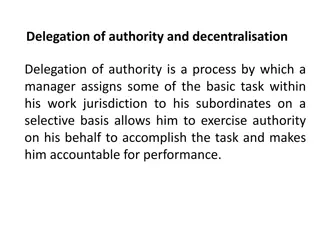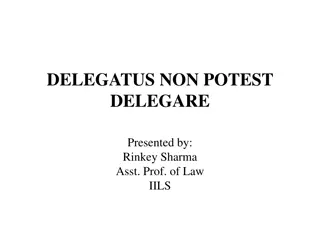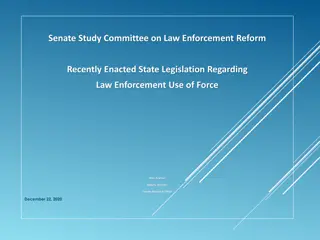Understanding Delegated Legislation in Admin Law
Explore the significance of delegated legislation in government affairs, its interrelation with separation of powers, and the delegation of legislative, executive, and judicial powers. Learn about the definition, validity, hierarchy, and importance of delegated legislation through real-world examples and legal principles.
Download Presentation

Please find below an Image/Link to download the presentation.
The content on the website is provided AS IS for your information and personal use only. It may not be sold, licensed, or shared on other websites without obtaining consent from the author. Download presentation by click this link. If you encounter any issues during the download, it is possible that the publisher has removed the file from their server.
E N D
Presentation Transcript
ADMIN LAW DELEGATED LEGISLATION
INTRODUCTION The interrelatedness of government affairs as well as the need for effective governance gave rise to the phenomenon of delegated legislation. Although the doctrine of strict separation of powers abhors the government overstepping its boundaries, it is impossible to maintain the doctrine strictly. Thus, the executive and judicial arms of government exercise powers ordinarily legislature and such exercise of powers is provided for by statute. idea of one arm of meant for the
INTD This topic would help students understand the importance and phenomenon of delegated legislation.
Delegated Legislation The legislative, executive and judicial powers of state may be delegated, through statute to a person other than the primary repository of those powers, it is important to note here that the focus of this topic is delegated legislation.
Definition Delegated/subsidiary legislation refers to a piece of subsidiary legislation which is made pursuant to delegated authority. Thus, before the delegated legislation comes into life, the authority to do so must exist. For instance, s. 46 (3) of the CFRN empowers the Chief Justice of Nigeria to make rules for the enforcement of fundamental rights in High Courts. Consequently, Hon. Justice Idris Legbo Kutigi (rtrd) promulgated the Fundamental Rights Enforcement Procedure Rules of 2009; the precursor was made in 1979.
Delegated Legislation Ordinarily, where the power to make delegated legislation does not exist, the subsidiary legislation made thereafter becomes invalid. Thus, in A-G Bendel v. A-G Fed & 22 ors (1981) 1 All NLR 85, a law that was purportedly enacted by the Joint Finance Committee of both Chambers of the National Assembly without constitutional imprimatur incompetent legislation by the Supreme Court and as such illegitimate, null and void. Where, however, the original repository of power ratifies the legislation, its validity becomes preserved. was declared to be
Hierarchy of Legislations An enabling law, whether it is the Constitution or other statute, which donates power to a delegated authority to make law, towers above subsidiary legislations. Thus, if a subsidiary/delegated conflicts with the parent law that delegated authority shall, to the extent of its inconsistency, be null and void. See NNPC v. Famfa Oil Ltd. (2012) 17 NWLR (pt. 1328) 148, 174 175. legislation
Delegated Legislation: Condition Precedent For a delegated legislation to be birthed without defect, certain conditions must be taken into consideration. Thus, not all delegated legislations can stand the test of legitimacy. The conditions precedent are: Power must be delegable There must be delegation of power; There must be proper delegation; Delegation of power must be to an appropriate authority.
Power must be delegable Core and solemn functions of organs of government cannot be delegated; especially those that require the exercise of discretion. The following functions cannot be delegated: a. Duties that have to be performed personally; b. Duties that involve the exercise of discretion; c. Judicial or quasi-judicial powers; and d. Core legislative functions.
There must be delegation of power Before a legislative power is exercised, the delegation of power must have been done. If there is no statute or instrument by which power is delegated, the thereafter shall be declared null and void and of no effect. See A-G Bendel v. A-G Fed & 22 ors (1981) 1 All NLR 85. This also applies to executive actions. See A-G Kaduna State v. Hassan (1985) 2 NWLR (pt. 8) p. 483 SC. action/legislation made
There must be proper delegation For a delegation, in this context, to be lawful, it must fall within the contemplation of the parent legislation. Thus, in NNPC v. Famfa Oil Ltd, the Back-in-Right Regulation of 2003 which was made by a minister in disobedience to the provision of law was nullified by court and the right which he claimed under the illicit law failed. For further reading Strengthening Legislative Controls Over Delegated Legislation in Nigeria, Nnamdi Azikiwe Journal of International Law and Jurisprudence Vol. 10 (2) (2019): 35. see Hilary Okoeguale,
Delegation must be to an Appropriate person/Authority Delegated power is expected to be donated to a person or authority that is appropriate. If the delegated authority is inappropriate, the legislation or act arising from delegated authority may be set aside by the court. See Nigeria Air Force v. James (2002) 18 NWLR (pt. 798) p. 295 SC.























